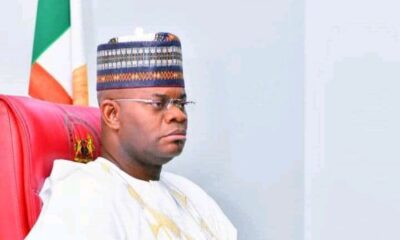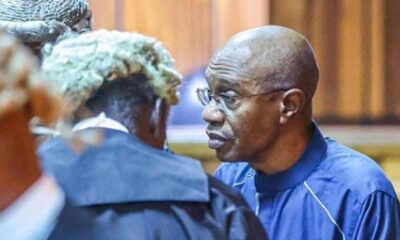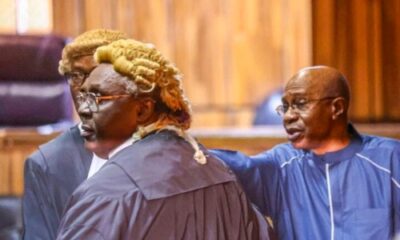The All Progressives Congress has waved off the reported plan by the Peoples Democratic Party presidential candidate in the 2023 election, Atiku Abubakar, to contest the 2027 election.
The APC Director of Publicity, Bala Ibrahim, in an interview with The PUNCH on Wednesday, described Atiku’s 2027 ambition as the most laughable news of 2024. He said the former vice-president would be defeated again.
The spokesperson for the ex-vice president, Daniel Bwala, had on Tuesday night confirmed that his principal would contest again the presidential election in 2027.
Atiku attempted to become Nigeria’s President six times but was unsuccessful in 1993, 2007, 2011, 2015, 2019, and 2023.
After the Supreme Court affirmed President Bola Tinubu as the winner of the 2023 election in which he came second, Atiku hinted that he was not retiring from politics and pledged his readiness to continue to shape the democratic discourse.
He had said, “As for me and my party, this phase of our work is done. However, I am not going away. For as long as I breathe, I will continue to struggle with other Nigerians to deepen our democracy and rule of law and for the kind of political and economic restructuring, the country needs to reach its true potential.
“That struggle should now be led by the younger generations of Nigeria who have even more stake than my generation.”
But speaking in an interview on Channels television on Tuesday night, Bwala described Atiku as the president Nigeria never had.
Responding to a question on whether Atiku would contest in the 2027 presidential election, the lawyer said, “Sure, he would run. He has the capacity, he has the wisdom, he has the knowledge, he has the energy.
”And he is a president we never had. Because to be honest with you, if any politician understands the private sector very well, it is Atiku Abubakar and our economy can only come alive if there is a private sector-led economy. He’s the president the country is missing because of his experience and capacity.’’
Commenting on Bwala’s disclosure, the PDP Deputy Publicity Secretary, Ibrahim Abdullahi, said it was a welcome development, but countered the insinuation that the 2027 presidential ambition of some leaders might put the party in limbo, adding that the PDP must galvanize, harmonize, and mobilize support ahead of 2027.
Abdullahi in a chat with one of our correspondents, stated, “It( PDP) is a political party. The ultimate objective and goal of a political party is to produce leadership. So, if people are interested in vying for the presidency, governorship, Senate, or whatever office in 2027 on the platform of the PDP, I don’t think they should begin to mobilise because that is one way you can keep a political party going.”
On the timing, he said “You cannot just wake up in the morning and instruct people not to nurse ambition. Then, it is not a political party. I understand the question to mean if they continue to promote their political ambition, it will be to the detriment of the political party; no, that is not correct.
“What I know as a politician: Politics is about ambition, politics is about interests. So, if people start jostling for power now, ahead of 2027 as you see it, it is not too early.
“There’s a need for them to cross the file and rank to ensure that they promote it in a healthy atmosphere, and that will keep the political party afloat. So, I am of the view that it is a healthy development. They should be allowed to do it once it is within the confines of the law.
“We’re not just expecting people to go campaigning now or rallying for support, but what they want to do is to promote the party and to be able to indicate interest in certain offices. It’s a healthy development.”
However, the APC publicity director Wednesday Atiku would lose the 2027 presidential election heavily. According to him, the former Vice-President does not have any political value.
On whether Atiku’s ambition is a threat to the APC, Ibrahim said “Our party, which is the All Progressive Congress, thrashed Atiku not once, not twice. Even when we thought he had the energy and little credibility to make him viable to Nigerians, we defeated him completely.
“How can someone who is just trying to regain his balance be a threat to the APC come 2027? That is unthinkable; Atiku can never be a threat to the APC. He wasn’t a threat when he had little value. How can he be a threat when he is already valueless? It’s a dream that will not come to pass.’’
The party spokesman advised the ex-VP to quit politics, noting that he was being misled by his aides and political associates.
- APC Knocks Former Vice President
Ibrahim added, “Atiku should better forget about politics completely. I think this is the imagination of Bwala and a few others around him. And it only goes to tell you that Atiku is surrounded by people who mislead him because anybody who has real feelings and concern for Atiku will not advise him to run against Tinubu again; not in the far future.
“This is not an issue of concern to the APC at all. Atiku is not a force to reckon with. He has never been a force to reckon with and he cannot be in 2027 when he must have diminished in terms of political value. We have not gotten to the bridge, but when we get there we will cross it.”
Some opposition political parties agreed that Atiku had the right to pursue his presidential ambition in 2027.
The New Nigeria People’s Party noted that though Atiku reserved the right to aspire to any political office of his choice, 2027 appears too far away to warrant a conversation yet.
The spokesman for the NNPP Presidential Campaign Council in the 2023 election, Ladipo Johnson, reasoned that a lot of events might happen between now and 2027 that could render the conversation around the subject unnecessary.
He said, “Daniel Bwala has the right to say whatever he wants regarding the ambition of his principal but it is left for Nigerians to decide what they want. Year 2027 is a long way to go and I think it will be improper to start a conversation around it. It is too early.
“In fairness to him, Atiku has the right to contest as many times as he wants. From now to 2027, a lot may happen. Let’s see how events play out.”
- Support Obi — Yunusa Tank
But the spokesman for the 2023 Labour Party Presidential Campaign Council, Yunusa Tanko in an interview with The PUNCH on Wednesday said Nigerians were tired of Atiku and others from the “old stock.”
Tanko, who said Obi would contest the 2027 presidential election, said the former Anambra State governor wanted to see Nigeria working for all.
He said “Anybody who wants to show ambition and start building at the moment, it is the person’s fundamental rights. But, we believe that we have the interest of people at heart. And the people are tilting towards us, especially the Nigerian youths. They are tired of the old stock.
“So even if anybody coming from the old stock still wants to run for election, we wish him all the best. But it could have been better for them to support a younger generation like Peter Obi in the form of uniting this country so that we can move forward collectively. That will have made more sense and more appreciative to the Nigerian people at the moment.
When asked whether Obi would contest the 2027 election, he said “ That one is sure. There is no ambiguity on that, that one is sure.”
He stated, “Obi prefers to see a Nigeria that is working, it is not his ambition that is most paramount. His interest is to see Nigeria working for everybody.”
However, the National Secretary of the Social Democratic Party, Mr Olu Agunloye, argued that there was nothing wrong with the ambition of the former vice president.
“The right to run for an election is reserved for all qualified Nigerians, including Atiku, and in 2027, a lot of people will throw their hats in the ring. So, I don’t see anything wrong with the aspiration of Atiku to run for the Presidency again.
“Yes, after losing his case at the Supreme Court, he called on the opposition to close ranks to stand a chance of dislodging the APC. That was a good call. But if you are asking for the position of the SDP on this, there is no way our party will support Atiku because we will field a presidential candidate come 2027,” he said.
In his usual blunt style, the 2023 presidential candidate of the Action African Alliance, Omoyele Sowore, dismissed Atiku’s chances in 2027, noting that though he is likely to contest, he would lose again.
“Atiku is a serial contestant and a serial loser. He’s got nothing to offer now or in the future,” Sowore said.
The Executive Director, YouthHub Africa, Rotimi Olawale, said the ex-VP was within his rights to contest again, adding, however, that older politicians should rather support and get behind younger aspirants.
“A government has barely even spent the first year in office. I think it is too early to predict what can happen over the next four years. Atiku is within his rights to contest the Presidency in 2027.
“My biggest advice would be that many of the old folks should yield the floor and support a younger generation of leaders to emerge across Nigeria,” he admonished.
Also in his contribution, the National Publicity Secretary of the Young Progressives Party, Wale Egbeola- Martins, said, “It is within the constitutional rights of any qualified Nigerian to aspire for the highest office in the land just as it is within the rights of electorates to reject or accept any individual through the ballot.
“It is too early in the day to start speculating whether Atiku Abubakar will contest in 2027 as the task before us now is ensuring good governance by holding the government in power accountable.
“While Atiku is eminently qualified to contest in 2027, the position of the YPP has always been that young, visionary, dynamic, and mentally progressive individuals without greed should be supported to leadership at all levels including becoming the President, hence effectively excluding Alhaji Atiku Abubakar as an option.’’
Credit: The Punch

 BIG STORY2 days ago
BIG STORY2 days ago
 BIG STORY5 days ago
BIG STORY5 days ago
 BIG STORY2 days ago
BIG STORY2 days ago
 BIG STORY5 days ago
BIG STORY5 days ago
 BIG STORY1 day ago
BIG STORY1 day ago
 BIG STORY1 day ago
BIG STORY1 day ago
 BIG STORY4 hours ago
BIG STORY4 hours ago
 BIG STORY3 days ago
BIG STORY3 days ago





























